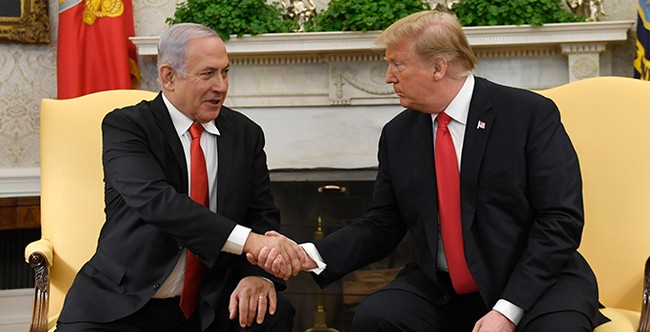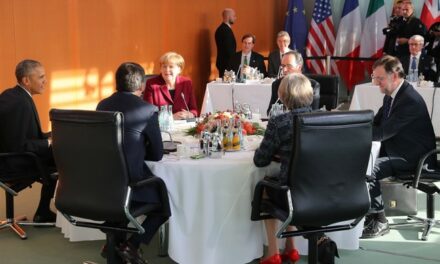We support our Publishers and Content Creators. You can view this story on their website by CLICKING HERE.

Alternate headline: Palestinian Authority Official Bucks History in Sensing Wind Direction.
The PA has long suffered from leadership that obstinately refuses to recognize reality, all the way back to its PLO roots. Has that begun to change with Benjamin Netanyahu’s reshaping of the region and Donald Trump’s return to the White House? Fatah general secretary Mohammad Hamdan may have vested interests in talking down Hamas, but it doesn’t mean he’s not right.
Advertisement
Hamdan tells the New York Post that he expects Trump to crush Hamas, but not directly. Trump will take down Iran, which will put a stake through the heart of Fatah’s bitter enemy. And that’s not Israel, as Hamdan tacitly admits:
“We are confronting Hamas’ ideology. Our problem is with Hamas’ link to regimes outside Palestine,” Mohammad Hamdan, secretary general of the PA’s ruling Fatah party, told The Post, referencing Iran in particular.
But Hamdan said he expects Trump’s return to the White House will lead to the jihadists’ defeat.
“We see that Trump and the ruling government in Israel are planning to destroy Iran, so Hamas [followers] will have no other choice than to become Palestinian,” the Fatah leader predicted. …
In interviews with The Post, Palestinian Authority leaders condemned the growth of Israeli settlements in the West Bank — but acknowledged Israel’s right to exist.
The PA has become more aggressive in fighting Hamas in the West Bank of late. That’s not because they support Israel, and especially not because they want to link arms with Netanyahu. Hamas has been an enemy of Fatah for decades, in part because of “ideology” — Fatah is less Islamist than Hamas and more born out of the socialist revolutionary movement — but also because of “alignment.” Hamas’ ties with the Muslim Brotherhood in Egypt might not have been so objectionable, but their obvious allegiance to Iran is. And of course, Hamas violently purged Fatah from Gaza after the 2006 elections put Hamas and Iran in charge of that enclave.
Advertisement
So yes, Fatah has lots of self-interest in positioning themselves in opposition to both Hamas and its allies, including Palestinian Islamic Jihad, also an Iranian proxy. Both of these groups have been popular in the West Bank too, especially after the October 7 massacres, which has complicated life for the ineffective and corrupt Palestinian Authority.
However, this PR effort signals something a little more, too. The PA has not exactly been pro-active in pursuing Trump in the past, preferring to deal with progressives in the US with more hostility toward Israel. This time, though, the battlegrounds have changed significantly, thanks to Netanyahu’s decision to fight this war to the end rather than cave to US pressure to return it to a frozen-conflict state as usual for the last two decades. That decision has put the Iranian mullahcracy at its most perilous state since the Iran-Iraq War, and it’s possible now to envision how the power will shift back to the Sunni states in a post-mullahcracy Iran — especially after the fall of Bashar al-Assad in Syria.
That determination by Netanyahu continues to the moment as well. Despite mounting pressure from the Biden administration to cut a hostage deal, Netanyahu refuses to commit to an end to the war as a condition of the exchange … especially when Hamas wants to exchange bodies rather than living hostages in the first phase:
Advertisement
Kan news, citing an unnamed Palestinian source, said Hamas is willing to release 22 of the 34 hostages on the list, but is refusing to agree to the release of the other 12. Instead, the report stated, the group offered to release 22 living hostages and 12 bodies during the first phase of a potential deal.
Israel turned down the notion and made it clear that it would only accept living hostages during the initial stage of a deal, the report added. …
Another stumbling block reported by Hebrew media is Hamas’s insistence that a proposed deal include the terms for an end to the war. The terror group was reportedly balking at recent remarks by Prime Minister Benjamin Netanyahu that Israel would resume fighting after the captives have been released.
Reportedly Hamas is still insisting on a 1:3 exchange ratio too, expecting their asymmetric precedent to be followed to the end. Netanyahu faces even more pressure at home to cut a deal than he’s getting from Joe Biden (and even Trump), but he’s not going to allow Hamas to start another war from Gaza. Regardless of criticism of his earlier policies regarding Hamas — which really resulted in large part from American pressure, not least of which from Jimmy Carter — Netanyahu has learned a lesson about Hamas and the need to end conflicts rather than freeze them.
Advertisement
This is the new environment in which the PA must operate. It now faces an Israel and a United States committed to the FO phase of FAFO, and a regional environment where they can expect no allies without cooperating with the legitimate powers that surround them. As long as that environment remains, and not a moment longer than it remains, Fatah will have to find ways to survive … and might start making their best decisions as a result.

 Conservative
Conservative  Search
Search Trending
Trending Current News
Current News 







